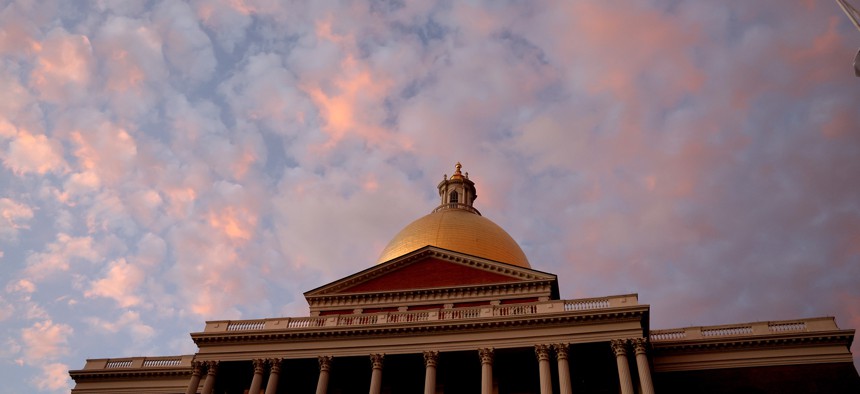The Battle Over a 'Millionaires Tax' Heats Up in Massachusetts

The Massachusetts Statehouse in Boston, in December 2020. Jessica Rinaldi/The Boston Globe via Getty Images
Voters will decide this November on a measure that would impose the tax on income over $1 million. Supporters say it would raise needed revenue for roads, transit and schools, while opponents argue it will revive the state's reputation as “Taxachusetts.”
There's a battle playing out in Massachusetts over a question on the November ballot that would raise taxes on individual income over $1 million.
Supporters say the surtax will address income inequality and raise much-needed funds for schools, roads and transit.
Opponents have branded it a "millionaires tax" and say it would hurt small business owners and the middle class while resurrecting the state’s reputation as “Taxachusetts.”
Both sides are spending millions of dollars on television ad campaigns to sway voters.
Question 1 would amend the state constitution to create an additional tax of 4% for income over $1 million, in addition to the existing 5% flat-rate state income tax. The additional money would be dedicated to funding education and transportation.
Massachusetts isn’t alone in pursuing additional taxes on top earners, said Lucy Dadayan, senior research associate with the Tax Policy Center, a non-partisan group that analyzes tax policy.
“Millionaires taxes have been debated for some time...in blue states like California, Connecticut, New York, Maine and Washington, D.C.,” Dadayan said. “Blue states are trying to make their income tax structures more progressive and more fair...and the red states are doing the opposite and giving tax cuts to the wealthy."
California voters in November will consider Proposition 30, which would raise taxes on those earning more than $2 million a year by 1.75% on the share of their income over that dollar amount. The measure would generate more than $3.5 billion annually, with most of the funds earmarked for incentives to purchase electric cars and build EV charging stations.
Many California progressives, who typically favor higher taxes on the wealthy, have come out against Proposition 30, including Gov. Gavin Newsom, who has pushed to ban gas-powered cars in the state.
Newsom and other critics say the ballot question benefits the app-based ride-booking company, Lyft. The company has plans to work exclusively with electric vehicles by 2030 and has spent $15 million to support the proposal.
In Massachusetts, opponents and supporters of Question 1 are running television commercials to win over voters. Business groups are fighting the measure, while supporters include the Raise Up Coalition, which is made up of education groups, labor unions and religious and community organizations.
The referendum represents a “once-in-a-generation opportunity…to make our tax system fairer, improve our schools and colleges, and fix our crumbling transportation infrastructure,” Fair Share for Massachusetts Campaign Manager Jeron Mariani said in a news release.
“Only those who earn more than a million dollars a year will pay more, and we’ll all benefit from $2 billion a year that’s constitutionally dedicated to transportation and public education,’’ Mariani said.
Opponents dispute that assessment. The anti-tax coalition says the measure would fall disproportionately on retirees and small business owners because large one-time gains such as the proceeds from selling a home or a business would be taxed at the higher rate.
And opponents point out, Massachusetts, like many states, has been seeing strong budget revenue: the Commonwealth was projected to end fiscal 2022 with a $1.9 billion surplus, according to preliminary figures released last month by Gov. Charlie Baker.
“Our state already has the biggest budget surplus in history,’’ Richard Schmalensee, a retired Massachusetts Institute of Technology economics professor, said in a TV ad opposed to the ballot measure.
Critics are also skeptical the money would be used for schools and transportation, as the amendment stipulates.
A study released in January by the Center for State Policy Analysis at Tufts University found that the millionaire’s surtax could raise a “meaningful amount of money” in a “highly progressive way likely to advance racial and economic equity.”
The overwhelming majority of Massachusetts residents will not be subject to the surtax, the study found. In 2019, approximately 21,000 state taxpayers reported incomes of more than $1 million. They represent 0.6 percent of all households in the state.
The study cautioned, though, that “tax avoidance could be widespread,” which would significantly reduce the amount of money the measure would raise. The Tufts researchers estimate the surtax would generate $1.3 billion annually, far less than the $2 billion figure cited by supporters.
Daniela Altimari is a reporter at Route Fifty.
NEXT STORY: Former State Lawmakers Fail in Fight to Clawback Pay They Voted to Cut





